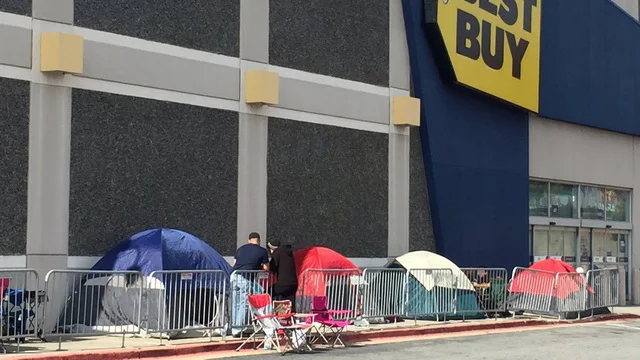Black Friday - Curse Or Blessing?
By Tom van Soest
This is the parting of the ways. As on one hand many retailers see Black Friday as a huge selling opportunity, some others say it negatively influences their performance for the rest of the year. This is mostly stated by smaller brands and stores who lose customers due to the special offers from the "big ones".
Not just a few people prepare days in advance for Black Friday, clicking through their favourite online shops and creating wish lists. As soon as the sales are starting, they just move it to their baskets and boom - saved some money.
Early in the days...
In the beginnings of Black Friday, this event was supposed to draw customers into the stores to start their Christmas shopping, falling on the day after Thanksgiving. The first recorded use of the term didn't have much to do with a great shopping experience, but was more applied to the collapse of the US market in 1896.¹ Later on in 1980, retailers reinvented Black Friday and put it on a more positive note, when they experienced that this occasion was the day when the stores finally turned a profit. The numbers would go from red to "black". Today it marks the kick-off for the Christmas shopping season.
Let's have a look at the numbers in retail
Looking at some numbers from previous years, many years retailers profited from the day. According to Adobe Analytics, U.S. retailers earned a record $7.9 billion on November 24, 2017, an increase of nearly 18% from a year before. NRF reported that 174 million Americans were out shopping on the Black Friday weekend (Thanksgiving through Cyber Monday) the same year. 64 million shopped both online and offline, 58 million only online and 51 million shopped only in stores. 11% of shoppers started their purchases even before 5 p.m. on Thanksgiving day. The most popular deals consumers were after, included tablets/laptops/PCs/TVs (27%), followed by clothing (24%) and smart-home gadgets (15%).
The list of the top online retailers on Black Friday in 2016 was led by Amazon, followed by Walmart.com and Best Buy. Nothing much has changed since then. Amazon founder Jeff Bezos's net worth past $100 billion, just the day after Thanksgiving 2017.
From the US to all over the world
Having its origin in the US, Black Friday has also become a thing in Europe. The Netherlands, Belgium, Germany, Sweden and France even developed a website dedicated solely to Black Friday offerings in 2017.
Has Black Friday lost its relevance or is it stronger than ever?
Customers queuing up in front of Best Buy on Black Friday at 5 a.m. to get the best deals
Opinions differ regarding this question. Some might claim that Black Friday is on the decline and losing its relevance while you can still see a lot of families lining up in front of Best & Buy from 5 a.m. in the morning. It is quite conceivable that with the rise of eCommerce, customers do not see the need in those special discounts at physical retailers, when they are able to get everything they want online.
Brick and mortar has realised already a long time ago that it is not sufficient anymore to have four walls filled with good stock. To keep up with online, especially when it comes to Black Friday, they have to offer more than just discounts. The in-store teams "have to be in sync with their customers".²
Store traffic significantly jumped 65% on Black Friday compared to a typical weekend day in November in 2016 in the US. Sounds promising, doesn't it?
Curse or blessing?
But is Black Friday really the money machine that retailers expect it to be? A lot of them know that it doesn't add extra spending from customers into the retail year but rather moves existing spending to an earlier period. Instead of customers buying small things here and here, everything comes together in the "Black Week". Some would assume that it does not matter when retail makes the profit as long as they make it, but what about losing constant foot traffic over the weeks in stores?
On the other hand, Black Friday is a convenient way to participate in creating brand awareness with the help of such events. Gregory Winters, North East Visual Manager at Jettco International, mentions that "perfecting these discount days is paramount to the longevity of retail while positively enhancing consumer engagement.
The concept of increasing retail sales figures with artful selling tools, special incentives and spirited advertising is nothing new. As consumers seek bargains on items the concept of Black Friday offers an effective way in generating interest and of course major sale increases in products, particularly tech goods and other costly items where significant discounting is rare." He sees Black Friday as a positive way to cultivate renewed interest in shopping and growing big consumer spending in brick and mortar.
Customers get stressed by too many Black Friday offers
Certainly, there are many voices amongst retailers who see more negative side effects. B&Q, for example, deliberately decided against taking part in the Black Friday madness. Some research they commissioned showed, that consumers trust retailers who offer year-round low prices far more than those who take part in the frequent sales and occasional offers. This is definitely a key point that brands should take into account when trying to build a consistent brand images and values to tighten their customer relationships.
Not only that it can decrease trust in retailers, but many shoppers also confessed that they feel overwhelmed and stressed by Black Friday. Making quick decisions on special offers can often lead into regret, which can increase negative brand associations towards certain brands. ³
Curse AND blessing
Like always: Balance is key. If you have outstanding ideas on how to take part in Black Friday sales to gain trust from your customers and to engage them, not only for one (black) day or one (black) week, retailers may highly benefit from Black Friday sales. Also depending on one's brand strategy and the competitive market, every retailer has to decide to which extent to participate or not.
So be it all said, happy shopping!
References
¹ History ; ² Retail Dive ; ³ Retail Gazette
Tom Van Soest
is the CEO of Visual Retailing. Having worked in the fashion and retail industry for decades, Tom focuses on empowering brands and retailers achieve a smarter working framework through technology and a cohesive vision.
To connect with Tom, you can find him on LinkedIn, Twitter or email him directly.

 Français
Français



